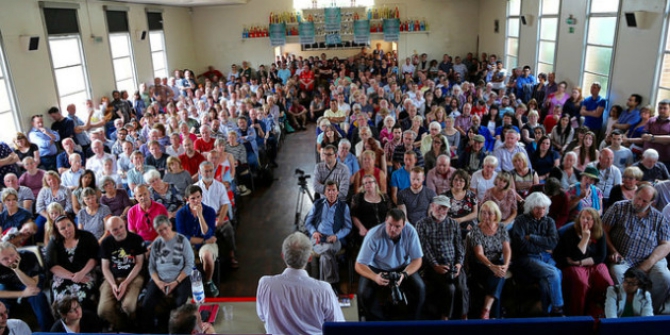
 With the issue of abortion appearing as an increasingly divisive debate, Sarah Childs and Elizabeth Evans hope for a broad coalition coalition of politicians to defend women’s existing abortion rights.
With the issue of abortion appearing as an increasingly divisive debate, Sarah Childs and Elizabeth Evans hope for a broad coalition coalition of politicians to defend women’s existing abortion rights.
Abortion it seems is back on the political agenda, although the Prime Minister has said that the government has no plans to change the law. Yet we have been reminded this last few days that a number of senior and high profile politicians would like to see a reduction in the time limit available: David Cameron would prefer 20 or 22 weeks; Theresa May, the Conservative’s most high profile woman MP, and the new Equalities Minister, Maria Miller both favour 20 weeks; whilst Jeremy Hunt the Health Secretary wants to halve the time to 12 weeks. There may be no plans for legislative change on behalf of the government – the Libdems have all been rather quiet – but Nadine Dorries MP, who sought to restrict women’s access to abortion in the last parliament, appears keen to do so in this one.
What to make of this flurry of ‘personal statements’? Dorries claims that they are part of a co-ordinated plan by Number 10 designed to placate the Christian community ahead of further announcements on gay marriage. On the other hand, feminist groups and some, mostly Labour, women MPs, such as Yvette Cooper and Stella Creasy, see this as further evidence that the coalition government are set to turn back the clock on women’s rights. Others view Hunt’s announcement as an(other) error by a rather hapless Minister; derailing a carefully worked out news grid in advance of the Tory party conference last week. All these explanations have some merit. That said, there is real concern amongst pro-choice advocates that a reduction of a week or two in the context of calls for a 12 week limit suddenly looks reasonable. Preparing the ground, perhaps. And it is worth re-iterating just how few abortions take place in the later stages, as Wendy Savage has already made clear in the Guardian: Some 91 per cent of abortions now take place below 13 weeks; only 1 per cent at the very late stage.
It is said that reduction is necessary because of developments in science. Yet Hunt has provided no such new evidence; ditto Miller. When the House’s Science and Technology Committee looked into the issue in 2008, there was no new science either. In any case, debates about abortion are not, and historically never were, just about science. It is as much a moral and ethical debate as it is a scientific one.
Should those in favour of accessible, legal and safe abortion be worried by these recent interventions? The answer has to be yes. Analysis of the parliamentary debates in 2008 is telling. Abortion votes may well be ‘free’ – MPs can vote according to their consciences – but party plays a huge role nonetheless. If there was a Conservative majority then the House would be less progressive on abortion than one with a Labour majority. The sex of our MPs matters too – not so much in terms of parliamentary votes (Labour MPs of both sexes will mostly file into the progressive lobby whilst Conservative MPs of both sexes mostly into the more restrictive lobby, with the LibDems as a party rather more divided), but it matters for how the issue of abortion is framed.
In 2008 the parliamentary debate on abortion linked to the Human Fertilization and Embryology Act was best characterized as one between Conservative men and Labour women, and one in which women’s interventions were substantively different from men’s: it was overwhelmingly Labour women MPs, and in the Lords Labour, LibDem and cross-bench women, who centered women in debates about abortion, conceiving of it in terms of women’s rights, and seeking to protect women from reforms that would constrain their access to abortion and might, ultimately, force them to carry unwanted pregnancies to term.
Analysis of the 2008 debate reveals 6 main dimensions:(1) science – both sides of the debate and both sexes used science as the basis for their arguments – underscoring the problems of viewing the issue as purely scientific; (2) social abortions – Conservative men spoke of women who treat abortion as a form of contraception, Labour women contested this interpretation; (3) protecting women – Conservative men for the most part, sought to stress the importance of protecting women from making rash decisions they might come to regret; women needed protection both from themselves and from what was depicted as the ‘abortion industry’; (4) women’s bodies – women from across the House, but most vocally Labour women MPs, maintained that it must be a woman’s right to determine what happens to her own body – the alternative is to coerce women to carry a pregnancy to term. Critics disembodied the debate and talked of wombs as if they were separate from the woman; (5) women’s choice – again women across the House, although once again many Labour women MPs, argued that women’s individual choices must be respected; and finally (6) protecting women’s health – this line of argument was adopted by Labour women worried that any restriction in the time limit would force women to travel abroad or seek out backstreet abortions.
What of the missing discourses? There is little sense that the Parliamentary debate recognized that abortion is something experienced by women from all walks of life. Many women may well be in the ‘abortion closet’ but amongst groups of women friends, it is likely that abortion will have been experienced and discussed by all sorts of women. The mid-30s happily married, middle-class wife and mother too often only appears in discussions of disabled fetuses.
Will this latest skirmish over women’s bodies fall back? Unlikely. Demonstrations outside abortion clinics are on the rise and there are individual MPs who will seek out opportunities to restrict abortion. In such a context, it clearly matters who are our MPs and Peers are. Conservative women MPs’ absence from the 2008 debates was notable – we surmised then that this might have reflected their minority presence within the Conservative party and, or their conservatism on this issue. Having more than doubled their number in the 2010 Parliament we await to hear the voices of the Party’s new intake of MPs – male and female. Will the women, like their over-represented Conservative men in 2008 debates, seek to limit abortion and to do so in terms that challenge established notions of women’s rights? Although it is notable that the newly elected MP Sarah Wollaston took to Twitter to make clear her opposition to a reduction. Labour men, who were conspicuous by their absence in the 2008 debates, may also no longer have the luxury of staying silent, as they did in the past. It is worth noting too that at the 2010 election Parliament lost several high profile pro-choice politicians (such as LibDems’ Dr Evan Harris and Labour’s Christine McCafferty and Julie Morgan, amongst others). Yet, with the issue of abortion appearing as an increasingly divisive debate within UK politics, and in the light of increased attacks on the time limit, even if only rhetorical at this point, it is clear that a wider coalition is needed to defend women’s existing abortion rights.
Note: This article gives the views of the author, and not the position of the British Politics and Policy blog, nor of the London School of Economics. Please read our comments policy before posting.
Sarah Childs and Elizabeth Evans are authors of: ‘Quicker than a Consultation at the Hairdressers: Abortion and the Human Fertilisation and Embryology Act 2008’, New Genetics and Society. Sarah Childs is also author of Sex, Gender and the Conservative Party: From Iron Lady to Kitten Heels, 2012, with Paul Webb.







